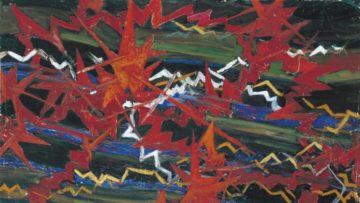Trevor Quirk in Guernica:
 For the millions who were enraged, disgusted, and shocked by the Capitol riots of January 6, the enduring object of skepticism has been not so much the lie that provoked the riots but the believers themselves. A year out, and book publishers confirmed this, releasing titles that addressed the question still addling public consciousness: How can people believe this shit? A minority of rioters at the Capitol had nefarious intentions rooted in authentic ideology, but most of them conveyed no purpose other than to announce to the world that they believed — specifically, that the 2020 election was hijacked through an international conspiracy — and that nothing could sway their confidence. This belief possessed them, not the other way around.
For the millions who were enraged, disgusted, and shocked by the Capitol riots of January 6, the enduring object of skepticism has been not so much the lie that provoked the riots but the believers themselves. A year out, and book publishers confirmed this, releasing titles that addressed the question still addling public consciousness: How can people believe this shit? A minority of rioters at the Capitol had nefarious intentions rooted in authentic ideology, but most of them conveyed no purpose other than to announce to the world that they believed — specifically, that the 2020 election was hijacked through an international conspiracy — and that nothing could sway their confidence. This belief possessed them, not the other way around.
At first, I’d found the riots both terrifying and darkly hilarious, but those sentiments were soon overwon by a strange exasperation that has persisted ever since. It’s a feeling that has robbed me of my capacity to laugh at conspiracy theories — QAnon, chemtrails, lizardmen, whatever — and the people who espouse them. My exasperation is for lack of an explanation. I see Trump’s most devoted hellion, rampaging down the halls of power like a grade schooler after the bell, and I need to know the hidden causes of his dopey rebellion. To account for our new menagerie of conspiracy theories, I told myself, would be to reclaim the world from entropy, to snap experience neatly to the grid once again. I would use recent books as the basis for my account of conspiracy theories in the age of the internet. From their pages I would extract insights and errors like newspaper clippings, pin the marginal, bizarre, and seemingly irrelevant details to the corkboard of my mind, where I could spy eerie resonances, draw unseen connections. At last, I could reveal that our epistemic bedlam is as a Twombly canvas — messy but decipherable.
More here.
